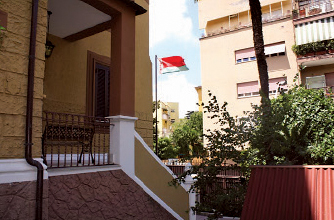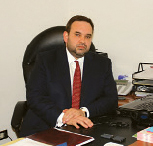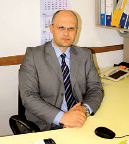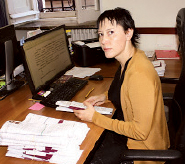Flight to Rome at the Minsk airport is always sunny at any weather conditions: in the queue for boarding it is noisy, many children are playing pranks, and nobody shouts at them for this. While children are happy about that. Even usually timid teenagers from boarding schools smile without special reasons and easily say hello to flight attendants in Italian: ‘buongiorno’!

View of Belarusian Embassy in Rome
But in Rome, at Via delle Alpi Apuane, 16, even noisy and expressional Italians are unusually concentrated and self-restrained. This address is not for idle people — it is the Embassy of Belarus.
To understand, how Belarusian diplomats work in Italy, we took one day — June 27th. It is a usual day, filled with meetings, phone calls and the preparation of documents.
 That day, the Head of the diplomatic mission Yevgeny Shestakov would have several meetings, including with the Ambassador of the Russian Federation in the Vatican and ex-minister of culture Alexander Avdeev. But early in the morning, there was a traditional, short meeting with diplomats. And though from the side it reminded a friendly conversation, it was an accurate conversation between experts.
That day, the Head of the diplomatic mission Yevgeny Shestakov would have several meetings, including with the Ambassador of the Russian Federation in the Vatican and ex-minister of culture Alexander Avdeev. But early in the morning, there was a traditional, short meeting with diplomats. And though from the side it reminded a friendly conversation, it was an accurate conversation between experts.Then there was time for a small excursion around the Embassy. It is a small private mansion in the style of a modern office. A photographer has nothing here to catch the eye. There are no architectural features, just smooth walls and small offices. But its modesty is deceptive. They did not save on office equipment. I see with my trained eye that they have modern computers, and the coffee here is obviously one of the best in the city. While the size of the ambassadorial courtyard confirms, how expensive land and real estate is in Rome.
“But our orange tree bears fruit and the birch that we brought from our native land has also started to grow. Yes, our building is an office, functional and not intended for carrying out representative activities, but it is absolutely normal. The President says that today, modern diplomacy should be extremely pragmatic and aimed at results.” Having no time to answer phone calls and my different questions, Yevgeny Andreevich is already not with me; I feel he prepares for the next meeting. Therefore I hasten to ask the ‘exciting’ question. Who is the main diplomat in the Embassy? The one engaged in the political issues or the economy, the consul or, maybe, a person responsible for scientific and technical co-operation?
“The work of the Embassy is aimed at the realisation of a solid global task. In our case it is mutual trade and export,” the Ambassador specifies. “Political work, humanitarian co-operation, working with the media, consular work, scientific and technical co-operation — these are all important daily components of the activity of diplomats. But today, we say that without normal policy there cannot be economy. Therefore all these directions work towards one global purpose — the formation of a worthy, unbiased attitude to our State.
We are all for dialogue — mutually-respective, let it be even critical, — but dialogue with all European Union countries. There is nothing ideal in the world. We do not ignore our failings, we discuss them, and we try to solve the things which are within our competence. The task of the Embassy is to explain, acquaint, convince and interest, in order that the attitude towards the country is not based on false representations or references to clichés.”
The life of a diplomat differs slightly from work of other civil servants. However, the working day is not fixed and days off for diplomats are an exception. The workers of the diplomatic mission seldom get home before midnight, even though the working day usually begins at 8am.
The first hours, as a rule, are the best for working with documents and letters. Then start the calls, meetings with officials in state run public authorities and colleagues in the diplomatic corps. An employee of a foreign establishment, especially in the trade and economic service, should be, as a matter of fact, a mobile manager. Diplomats do not afford such luxury as bookwork: most effectively trade and economic questions in Italy are solved during personal contact — eye to eye. All the work of the Embassy is that foundation on the basis of which our trade and our exports develop, and as a result, the well-being of our people and our state finally grows. The trade and economic service is a locomotive which works for the realisation of the main task of the Embassy.
The staff of mission is small, therefore the qualifying requirements of employees are high. All of them, as a rule, have two higher educations and good language preparation. The Ambassador knows four European languages. One more distinctive feature of our diplomatic mission in Rome is the active presence on Internet social networks. As employees of the Embassy say, today, it is the most mobile and effective way of distributing information on the activity of the diplomatic mission, and about the policy of Belarus; and young active diplomats do not lag behind here.
‘Locomotive’ gathers pace
“For last five years, goods turnover between Belarus and Italy has grown from $900m in 2009 to $2bn in 2013.” Senior Counsellor, Yevgeny Sobolevsky, supports the thesis of the Ambassador with concrete figures. “Thus exports have increased almost fivefold and at a multiple growth of export-import goods-flows, the negative balance was reduced from $522m to $204m.”
 We do not reduce our pace: for first four months of this year, mutual turnover has grown by 16.2 percent up to $783.6m, thus export has made $450.6m — a rate of growth, in comparison with the similar period of last year, is 120.5 percent. We are glad that there was a positive balance at a rate of $117.5m and healthy structure of imports is represented basically by technologies. Economy modernisation is impossible without buying modern technology and manufacturing. They make up the majority of Belarusian imports from Italy.
We do not reduce our pace: for first four months of this year, mutual turnover has grown by 16.2 percent up to $783.6m, thus export has made $450.6m — a rate of growth, in comparison with the similar period of last year, is 120.5 percent. We are glad that there was a positive balance at a rate of $117.5m and healthy structure of imports is represented basically by technologies. Economy modernisation is impossible without buying modern technology and manufacturing. They make up the majority of Belarusian imports from Italy.The second serious task of the ‘economists’ of a diplomatic mission is the attraction of investments that are necessary for economic modernisation. Today, it is question number one on the agenda of any state for its survival and competitiveness. We here are not an exception. We work: for the last five years, the volume of direct annually attracted investments from Italy to Belarus has grown from $3.1m to $56.6m.
For the first quarter of 2014, direct Italian investment into our economy reached $17.5m — growth, in comparison with last year’s period of 11.4 percent.
Today, Italy is included into group of leaders by the quantity of the created joint and foreign enterprises in Belarus. Thus, in a database of the Uniform State reserve of legal bodies and individual entrepreneurs of Belarus, there are 173 operating legal bodies with Italian capital investment. These are 102 joint ventures and 71 foreign enterprises with Italian capital.
Thanks to constructive interaction of the Belarusian side with the largest export credit Italian agency SACE, it was possible to, not only to provide a continuation of the process of modernisation of a range of branches of our industry, with the help of Italian equipment, but also to receive, last year, a record volume of guarantees on transactions at a rate of 100m Euros.
The everyday work of employees of the trade and economic service represents answers to dozens of inquiries from Belarusian businesses. They apply for information, and it is necessary to check potential partners on their inquiries — how reliable are they, what is their reputation and whether they are solvent?
Sometimes, for example, people ask ‘Who can buy your peat?’ One would think that today, with the Internet, it is easy to find answers to all questions; but actually, it’s not so simple.
At the large enterprises, there are marketing specialists. Maybe they know the Italian market better, according to their subject area. But there are also dozens of other, smaller enterprises in these areas, in which it is difficult to orient oneself. The Embassy for them is open. We give assistance to all enquiries without dependence on the form of ownership. Both state enterprises and private traders apply to us. And we do not divide anybody into ‘our people’ and ‘strangers’ — they are all ‘our people’, taxpayers. All their successful transactions become our total export or import, that’s necessary for us — all of them are equal.
Another matter is the work with our major companies; they do not need us to take them under our wing. However, we try not to let them out of our field of vision and their work in the Italian market. If they are mistaken somewhere, we prompt them, insure, knowing the specificity. Certainly, we do not pretend to know how to sell their products or services, but we know the rules of the game in our host country, and are obliged to prompt and organise, so that there is a possibility to reach potential buyers.
All roads lead to Rome
There are very few places in the world where your feet stand on the territory of one state, and your hands rest against another state, while your vision is surprised at the architectural symbols of a powerful and influential third state. But in Rome, it is possible to simultaneously see Italy, possession of the Vatican and the Sovereign Military Order of Malta.
This Italian feature influences the work of all diplomatic missions: Rome, as a point of diplomatic presence, includes a large quantity of embassies accredited directly in Italy, the huge block of embassies in Vatican City and under the Sovereign Military Order of Malta. It is necessary to co-operate simultaneously with three political forces which are rather influential on the world arena. Many states have three diplomatic representations here, for example, the Russian Federation.
One more category of missions — accredited under FAO is the Food and Agriculture Organisation of the United Nations. Last year, Belarus signed an agreement with the organisation regarding technical help, and now, the legal conditions for the realisation of various projects in our country are created. One of which — ‘Emergency Assistance to Control the African Swine Fever Outbreak in Belarus’ with a budget of $420 thousand, began last year. Minsk is also ready to participate in other projects. Active dialogue with the FAO continues with a visit by the Director General of the FAO, José Graziano da Silva, to Minsk, expected in the second half of this year.
Alloy of reaction and iron endurance
The most populous place in any embassy is the consular department. Its work at first sight consists of the procedure of giving visas — 11 thousand of which were given last year.
However, employees of the consular service also conduct cases concerning adoption, participate in lawsuits and make various notarial procedures.
In the consulate, even on non-visiting days, there is a working atmosphere. Apart from personal appointments or phone calls, employees answer emails every day.
 The Counsellor on Consular Questions, Victoria Parkhotik, says that sometimes there are more than thirty of them, “But we chose a form of work ourselves. It usually relates to the list of documents which citizens should collect. Sometimes, a telephone conversation leads to misunderstanding, ‘And you told me this, oh, I have not heard, I have forgotten!’ And citizens from all across Italy contact us.
The Counsellor on Consular Questions, Victoria Parkhotik, says that sometimes there are more than thirty of them, “But we chose a form of work ourselves. It usually relates to the list of documents which citizens should collect. Sometimes, a telephone conversation leads to misunderstanding, ‘And you told me this, oh, I have not heard, I have forgotten!’ And citizens from all across Italy contact us.A separate story is about the necessary certificates on returning — the document for returning into the country in case of a lost passport. In Italy, it happens quite often that our tourists lose their documents together with their purses. Alas, during the tourist season in Italy, people not only have a rest: thieves and pickpockets work non-stop.
When happy parents apply to us, we suggest the Belarusian-Italian couples also get a Belarusian passport for their child. It has already become a classic situation where Belarusians face a situation when, if a child does not have a Belarusian passport, the Italian father can not to give an exit permit for the kid. And then, the trip home to mum is qualified as kidnapping. We are all for love and happiness, but anything may happen in life, and we do face such situations. Therefore all our citizens who apply to the Embassy, receive consult with us on a wide spectrum of legal subtleties.”
Non-visiting day in the Embassy is not a day off but a chance to work on those problems with which puzzled staff during ‘visiting days’. Victoria Petrovna’s desk is filled with a huge number of letters, and envelope may need two hours of attentive, concentrated work. People marry, get divorced or establish paternity — someone’s destiny and problems of legal property which should be solved.
According to the Consul, consular work is ‘people’. “Our work does not accept superficiality, conceit or arrogance. Perhaps the most difficult thing for employees is to observe a healthy balance between emotional responsiveness, empathy and efficient detachment from a problem. Consular work is an alloy of fast reaction to an event and at the same time, iron endurance.”
Let the sun always shine
Another group of children have arrived from Minsk to have rest with their families. Some children are here for the first time. These are children from Chernobyl-affected areas; pupils from children’s homes and boarding schools, children from incomplete and needy families. It is important that the humanitarian organisations of Italy create various projects and within Belarus, help with the repair of children’s recreation camps, aid medical centres and organise training courses for graduates of children’s homes. The Italian Republic is the basic partner of Belarus in the health improvement of children. Statistical data shows that from 24 thousand children, who had holidays abroad in 2012, 13.2 thousand spent their summer holidays in Italy.











